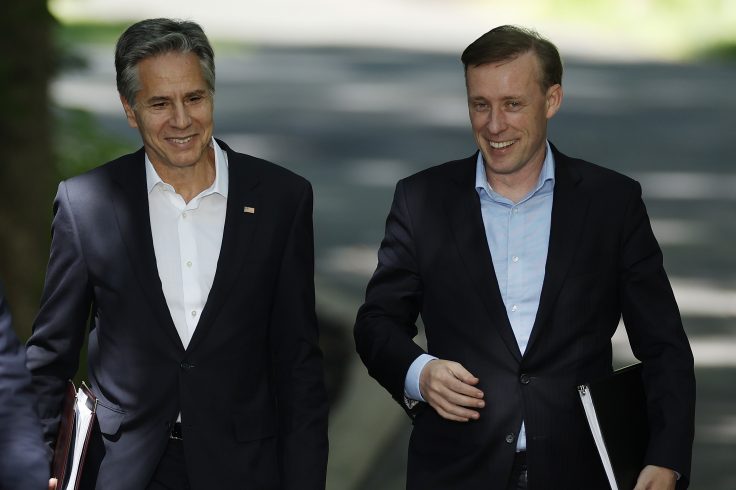When the 2020 Democratic primary was underway, an activist group founded by current national security adviser Jake Sullivan convened some of the party’s top foreign policy thinkers. At the first session of their conference, Sullivan asked what the country’s main challenge was. One participant offered political polarization, former Obama speechwriter Ben Rhodes illustrated the point by retorting that the Republicans were America’s biggest problem, and others listed a range of concerns from climate change to America’s dwindling advantage in high technology.
When a party’s foreign policy elite downplays China’s rise, Russia’s rampage across the Middle East and Eastern Europe, and Iran’s steady progress toward the bomb, something big has gone awry. The Democratic Party’s inward turn is a major story that will be an important factor in global politics for years to come. Politico’s Alexander Ward touches on this development in The Internationalists, though it follows a different narrative arc for Joe Biden.
As he describes it, The Internationalists is "a story of a team that came in with immense confidence, lost it during the withdrawal of Afghanistan, and found their mojo again with the defense of Ukraine." With the failure of last year’s counteroffensive, Ukraine’s hard slog on the battlefield, and the aid bill stalled on Capitol Hill, the mojo seems to have gone missing again.
Observers might disagree with the book’s premise, but The Internationalists still reveals how much of the Democratic Party thinks about global affairs. Ward describes Sullivan’s "foreign policy for the middle class" as a major departure in Democratic foreign policy and a key component of Bidenism. Essentially, Sullivan repackaged the Obama-era emphasis on infrastructure and green energy spending, added some subsidies for high-tech manufacturing, and embraced Donald Trump’s trade policies. Not exactly revolutionary, but the strategy has mostly appeased the party’s activists and labor unions and created some consensus within the party about how to confront China.
The rest of Biden’s priorities are less clear: Climate change is the "top national security priority," but the administration is also "laser focused" on "Russia, Russia, Russia, and China, China, China." "Bidenism" is "a new muscular, Democratic approach to foreign policy," in which "the guns would be holstered if the cause of the moment was not clearly and directly in the American interest." This is largely pablum—what president uses force when he does not think American interests are at stake?—and is neither new nor muscular. Many of Biden’s policies, virtually all of his senior officials, and much of his rhetorical framing come straight from the Obama administration.
According to Ward, some administration officials refer to themselves as the A-Team, and they seem to enjoy comparisons to Abraham Lincoln’s "team of rivals" cabinet and John F. Kennedy’s "whiz kids" that David Halberstam depicted in The Best and the Brightest. Of course, Halberstam lamented how few readers understood that his book’s title was ironic. Much like the Kennedy administration, the gap between the Biden team’s self-regard and achievement is immense. Secretary of State Antony Blinken believed that he was restoring American diplomacy and international leadership, but he did not follow through on his promises to consult the NATO allies who had deployed troops in Afghanistan before the final decision to pull out, nor to take care of the State Department team that returned from Kabul after the collapse. Ward notes that Defense Secretary Lloyd Austin’s main qualifications were his loyalty to the Biden family and his unwillingness to defend the Pentagon’s interests in interagency battles.
The Afghanistan debacle is tough reading, although Ward captures the administration’s internal battles well. The military knew that the withdrawal would doom our Afghan allies, but Biden made clear during the policy review that he would only countermand Trump’s planned withdrawal if some miracle stabilized Afghanistan. While the State Department lectured the military about having "a much higher risk tolerance than you guys" and planned to maintain the Kabul embassy, Sullivan questioned the wisdom of closing the Bagram airbase early. Biden’s strict troop limits made holding Bagram impossible though, and 13 Americans died defending the vulnerable Kabul airport during the evacuation.
It is not clear why the Biden team gives itself such high marks for its maneuvers before Russia invaded Ukraine. In the year preceding the attack, Biden and his team repeatedly delayed or suspended weapons deliveries to Ukraine, at some points driving the frustrated Ukrainians to long for the days of the Trump administration. Biden and his subordinates repeatedly called President Zelensky to demand that he take the Russian invasion threat more seriously, only for him to ask why they would not send him more weapons if they were so sure that war was coming. State’s Wendy Sherman gave beautiful speeches to her Russian counterparts about NATO resolve and unity, only for Biden to undercut her days later by saying that a "minor incursion" would divide the alliance. One Biden official complained to Ward, "we’re doing everything right and the Russians are probably going to invade anyway"—which is to say, they were not doing everything right.
According to Ward, Biden went to Kyiv after the invasion because he "wanted to show that America’s commitment to allies and democracy didn’t need to be demonstrated with force. It could be underscored with physical presence, engagement, and assistance." But Ukraine did not need visits and kind words, it needed Biden to speed up weapons deliveries and training instead of dragging his feet.
Ward points out that the Afghanistan humiliation was "Bidenism in action." He’s right.
The Internationalists: The Fight to Restore American Foreign Policy After Trump
by Alexander Ward
Portfolio, 368 pp., $32
Mike Watson is the associate director of Hudson Institute's Center for the Future of Liberal Society.
